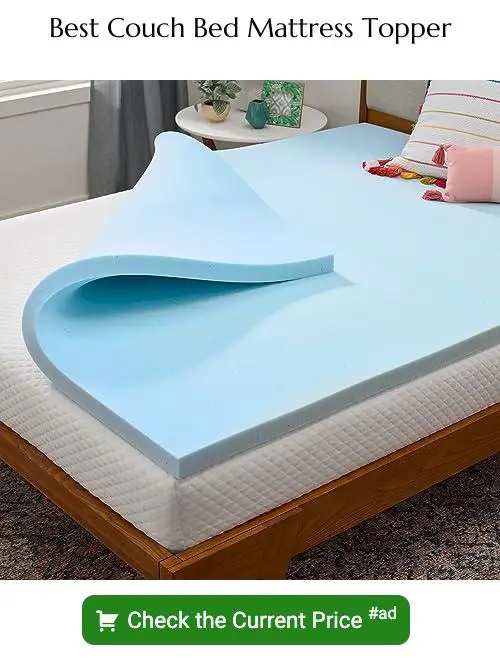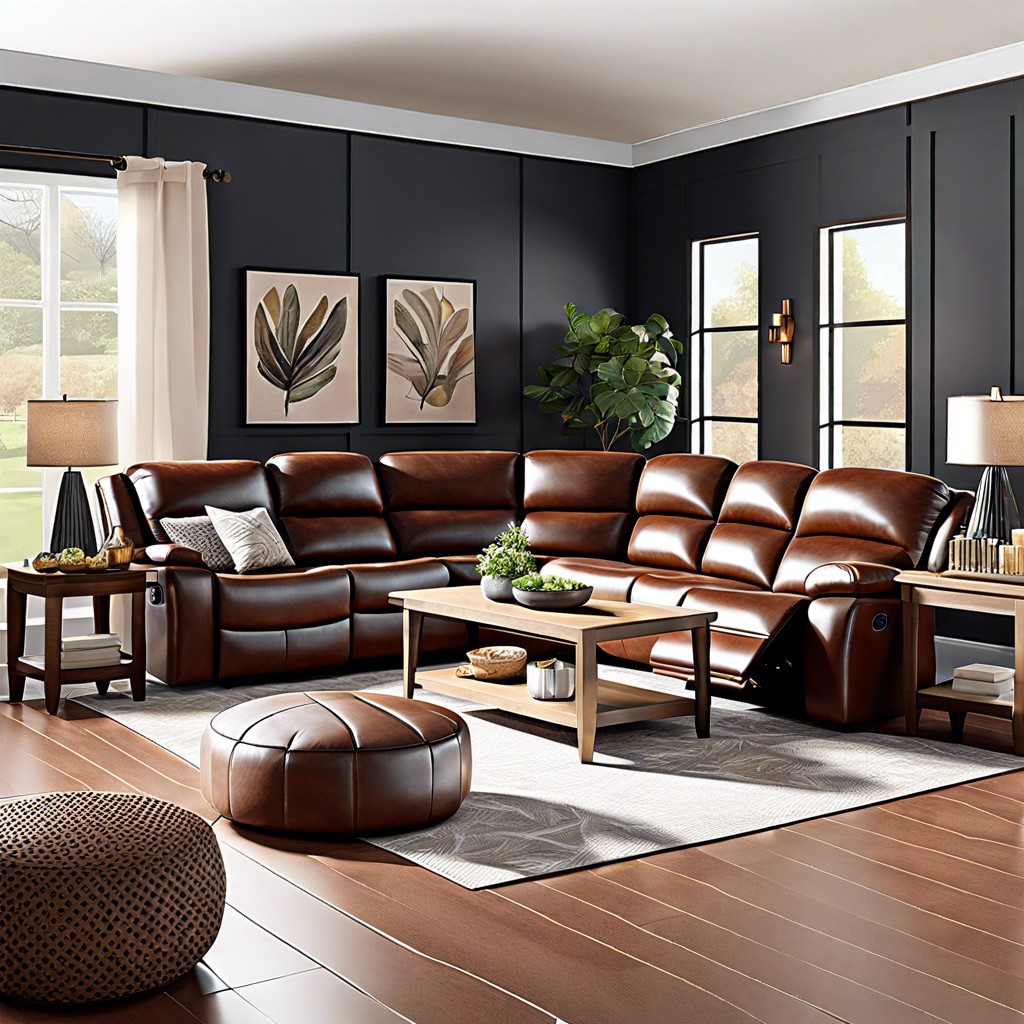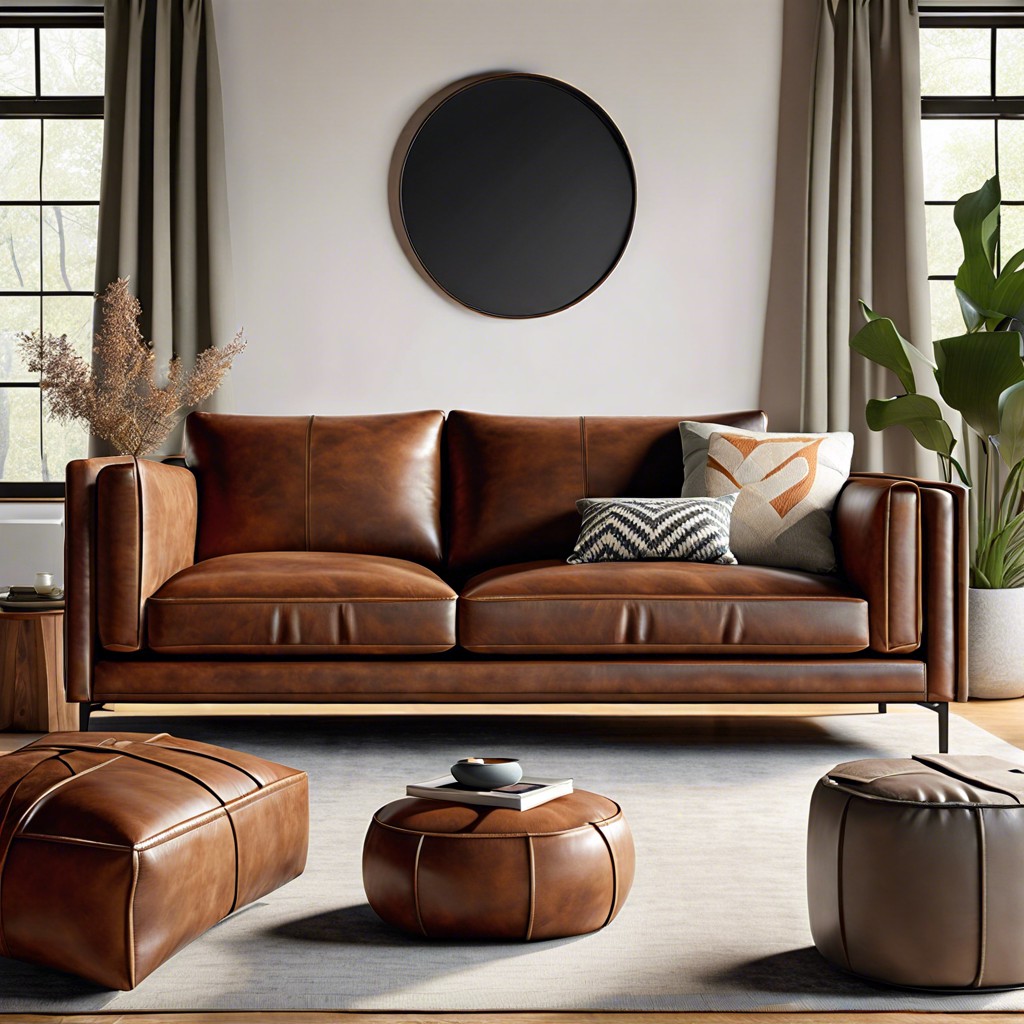Last updated on
Discover how consistently sleeping on your couch may impact its lifespan, comfort, and overall condition as we delve into the effects of turning a sofa into a nightly resting spot.
Have you ever fallen asleep on your couch and wondered if it’s damaging the fabric or structure of the sofa? Or maybe you’ve had guests stay over and slept on your couch, leaving you worried about the potential wear and tear. Well, fear not! In this article, we’ll explore whether sleeping on a couch can ruin it or not.
So sit back (on your couch, if you’d like), relax, and let’s dive into this topic together.
Key takeaways:
- Consistent sleeping on a couch can cause wear and tear.
- Upholstery damage from sweat and body oils is a risk.
- Sleeping on a couch can put stress on certain body parts.
- Couch cushions can lose shape and support over time.
- Couch frames can be damaged from consistent use as a bed.
Table of Contents
Does Sleeping On a Couch Ruin It?
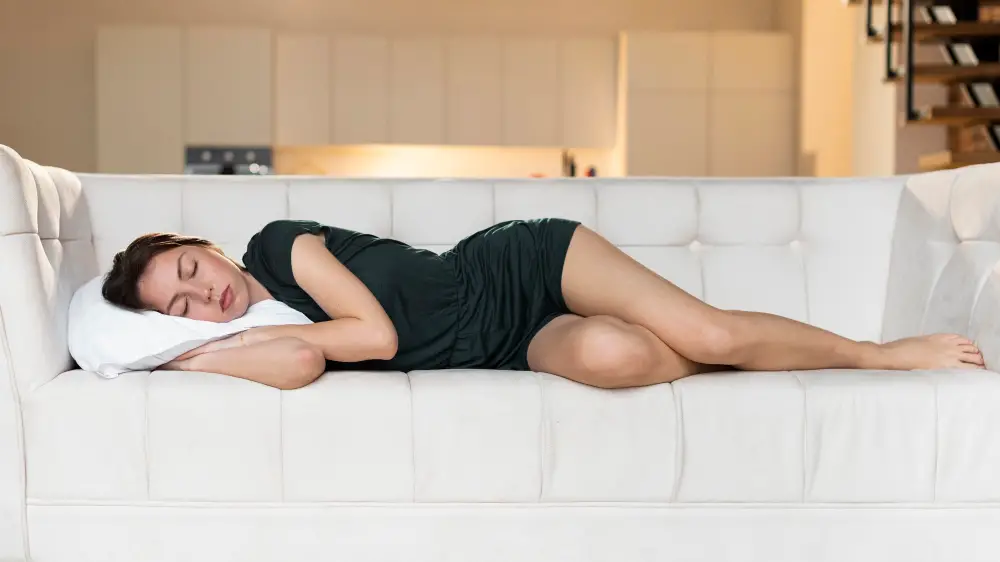
What Happens When You Sleep on a Couch?
It’s not uncommon to fall asleep on the couch while watching TV or reading a book. However, if you make it a habit of sleeping on your couch every night, you may be wondering what impact this has on the sofa’s lifespan and overall condition.
One of the most significant effects is wear and tear. Consistently sleeping in one spot can cause cushions to flatten unevenly, leading to discomfort when sitting or lying down.
Repeated pressure in one area can cause sagging or even breakage of springs within the sofa frame.
Another issue that arises from regular couch-sleeping is upholstery damage caused by sweat and body oils. Over time these substances will seep into fabric fibers causing discoloration and stains that are difficult (if not impossible) to remove.
Lastly, there’s also an increased risk for spills from food or drinks consumed while lounging around which could lead to permanent staining as well as unpleasant odors emanating from your beloved furniture piece!
What Happens When You Sleep On a Couch?
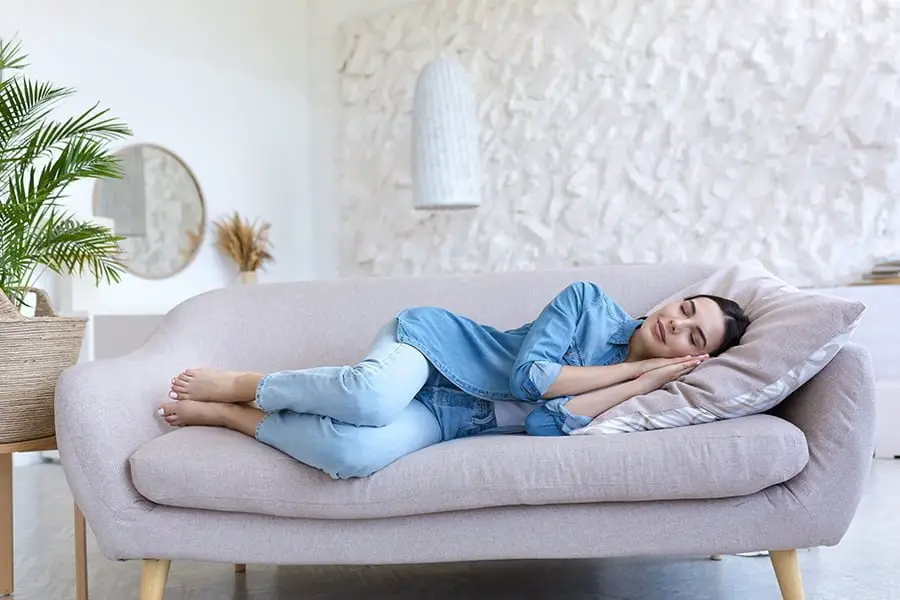
On the one hand, it may be more comfortable than sleeping on the floor or in an uncomfortable bed. However, there are also some downsides to consider.
One of the main issues with sleeping on a couch is that it can cause wear and tear over time. Couches are not designed for regular use as beds, so they may not hold up well if used in this way consistently.
Sleeping on a couch can put stress on certain parts of your body that wouldn’t normally be affected when you sleep in a bed. For example, your neck might get strained from having to prop yourself up with pillows or cushions.
Another issue is hygiene – even if you regularly clean your sofa covers and cushions; they still accumulate dust mites which could trigger allergies while asleep.
Couch Materials and Wear

Leather, for example, is known to be durable and long-lasting but can crack or fade if not properly cared for. Fabric sofas are often more comfortable than leather ones but may show wear and tear more quickly.
If you’re someone who frequently sleeps on the couch, consider investing in a high-quality sofa made from sturdy materials that can withstand regular use. Look for fabrics that are easy to clean or have stain-resistant properties.
It’s also important to note that sleeping on the same spot repeatedly can cause uneven wear on your couch cushions. To prevent this issue, try rotating the cushions regularly so they receive equal amounts of pressure.
Impact On Cushion Support
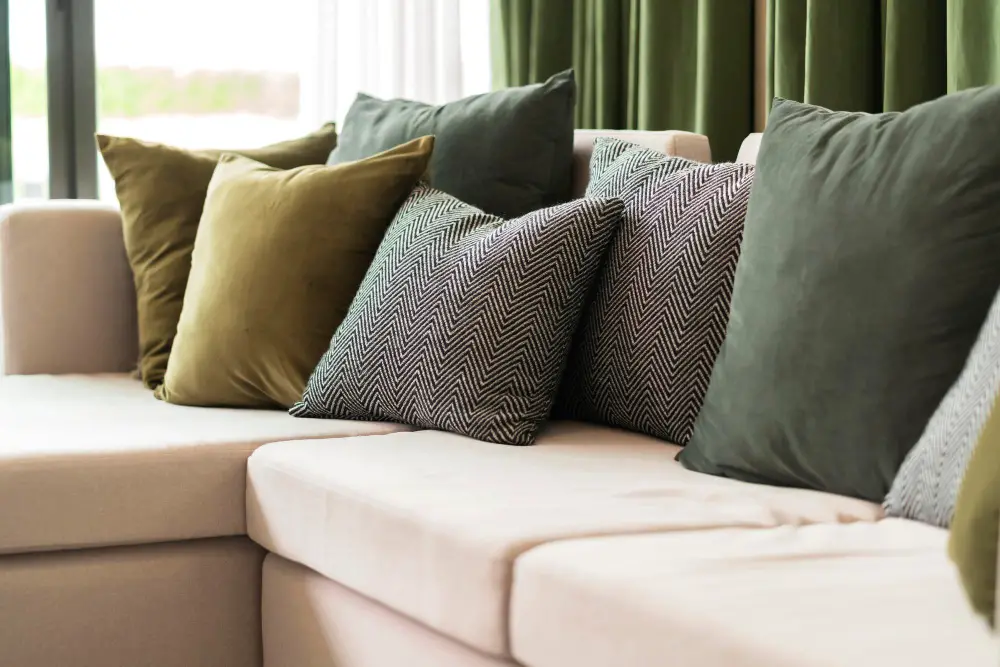
Over time, this can cause them to lose their shape and support. The more often you sleep on the couch, the faster this will happen.
The impact of sleeping on cushion support is especially noticeable in cheaper or lower-quality sofas that use low-density foam for their cushions. These types of cushions are less durable and tend to break down quickly with regular use.
If you’re someone who frequently sleeps on your couch or has guests over who do so regularly, it’s important to invest in a high-quality sofa with sturdy cushioning materials such as high-density foam or memory foam. This will help ensure that your sofa maintains its shape and comfort level even after extended periods of use.
In addition to investing in quality materials for your sofa’s cushions, there are also steps you can take at home to maintain their support levels over time. One simple solution is fluffing up the pillows every day before using them – this helps redistribute any compressed filling material evenly throughout each pillow so they don’t become lumpy or misshapen from prolonged pressure points during sleep sessions.
Couch Frame Stress
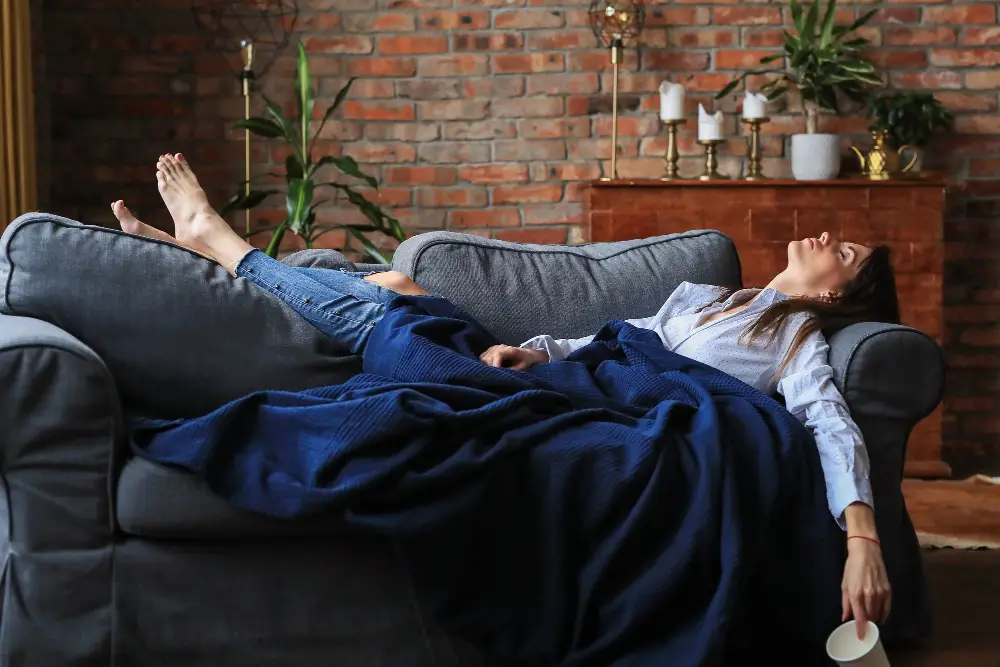
Over time, this can cause damage to the frame and potentially lead to structural issues. The weight of your body pressing down on certain areas of the couch repeatedly can cause wear and tear in those spots.
If you frequently use your couch as a sleeping spot or have guests who do so regularly, it’s important to pay attention to any signs of stress on the frame. Look out for creaking sounds when sitting or lying down, wobbling legs or armsrests that feel loose.
To avoid putting too much strain on your couch’s frame while sleeping, try using pillows under your head and knees instead of resting them directly against hard surfaces like armrests. Consider investing in a high-quality sleeper sofa with sturdy construction if you plan on using it frequently as both seating and bedding.
Upholstery and Stains
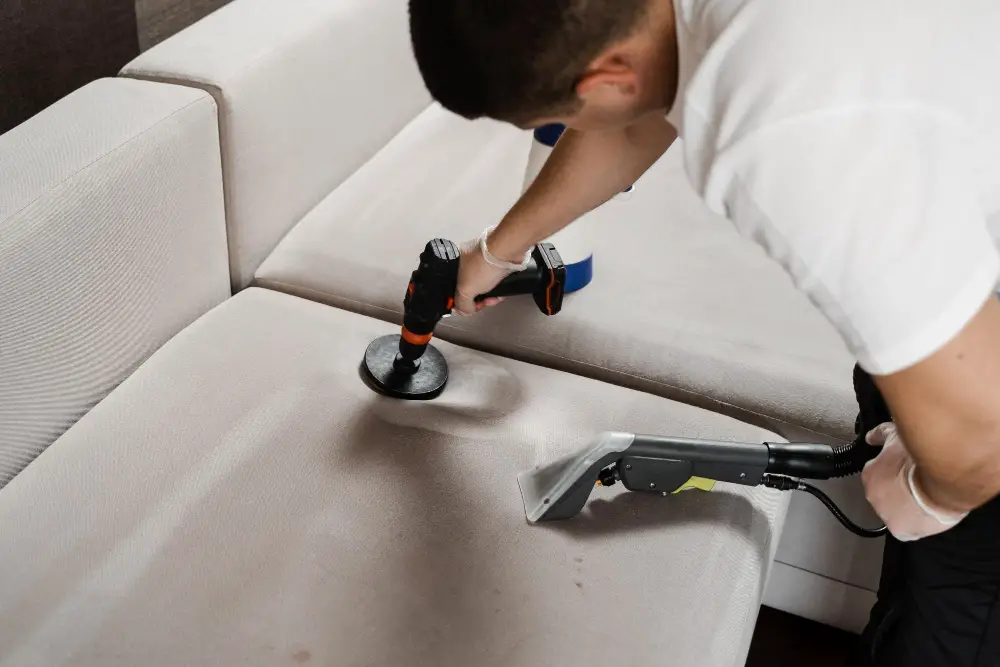
Whether you’re enjoying a late-night snack or accidentally spill your drink, upholstery can be difficult to clean and maintain. The type of material used in your couch’s upholstery will determine how easily it stains, as well as how easy or difficult it is to remove those stains.
Leather sofas are generally easier to clean than fabric ones since spills can be wiped away quickly without leaving any marks behind. However, leather may not be as comfortable for sleeping compared with other materials like cotton or microfiber.
If you have a fabric sofa that has been stained by food, drinks, or even sweat from prolonged use during sleep time; there are several ways you can try cleaning them up yourself before calling in professional help.
Sleep-Related Furniture Damage

In fact, sleep-related furniture damage is a common issue that homeowners face. Whether you’re sleeping on your couch every night or only occasionally, there are several factors to consider when it comes to protecting your furniture from wear and tear.
One of the most significant contributors to sleep-related furniture damage is body weight. Over time, repeated pressure from sitting or lying down in the same spot can cause cushions and upholstery materials like foam padding or polyester fiberfill stuffing inside them to compress unevenly leading them losing their shape and supportiveness.
Another factor that contributes significantly towards this type of wear-and-tear includes spills caused by food crumbs falling between cushions while eating snacks during movie nights with friends/family members who visit often for such events.
How Are Couches Damaged?

The frequency of use and the weight of the sleeper can cause wear and tear on a couch over time. Sleeping on a sofa every night can lead to sagging cushions, which may eventually lose their shape entirely.
Sleeping in one spot repeatedly can create permanent indentations in the cushioning or even break down springs within the frame. This is especially true for older sofas that have already experienced some level of wear.
Upholstery materials also play an important role in how easily a couch becomes damaged from sleep-related activities. Leather or vinyl upholstery may be more resistant to stains but could crack over time if not properly cared for.
On the other hand, fabric upholstery is more prone to staining but tends to hold up better against regular use than leather or vinyl options do.
Avoiding Couch Damage
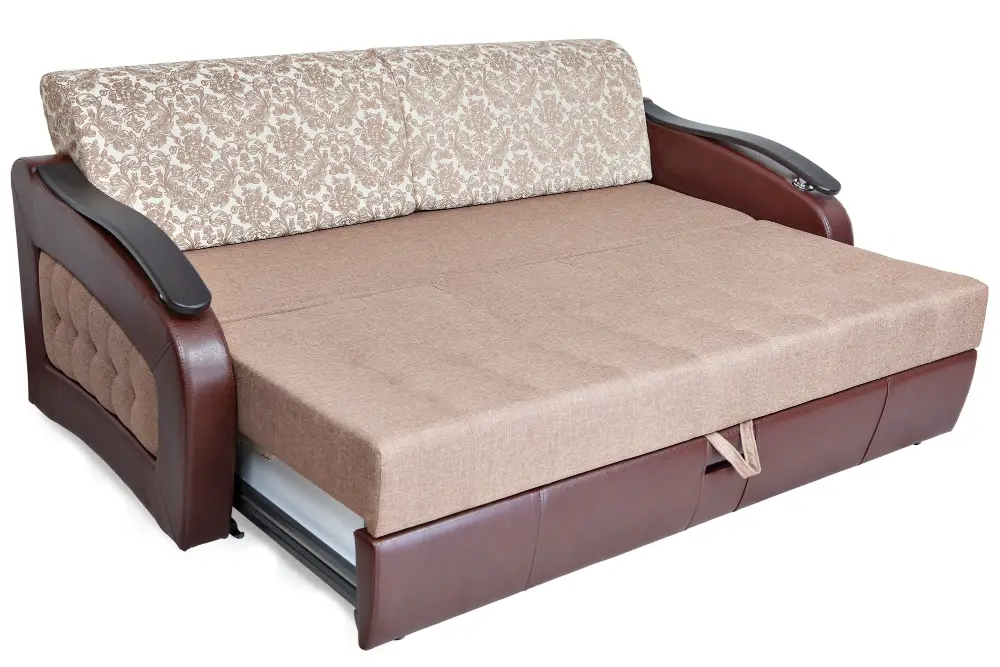
If you’re going to be sleeping on a couch regularly, consider investing in a sleeper sofa or futon designed specifically for that purpose. These pieces of furniture are built with sturdier frames and more durable materials than regular sofas.
If you do decide to sleep on your couch occasionally, there are some steps you can take to minimize damage. First and foremost, make sure the cushions are properly fluffed before lying down so that they provide adequate support without sagging or flattening over time.
Try not to jump onto the couch or use it as a trampoline – this can cause stress on the frame and lead to structural damage over time. Avoid eating messy foods while lounging on the sofa as well since spills can stain upholstery irreparably.
If possible rotate cushions periodically so they wear evenly across all sides rather than just one area becoming flattened from repeated use in one spot.
Types of Couches
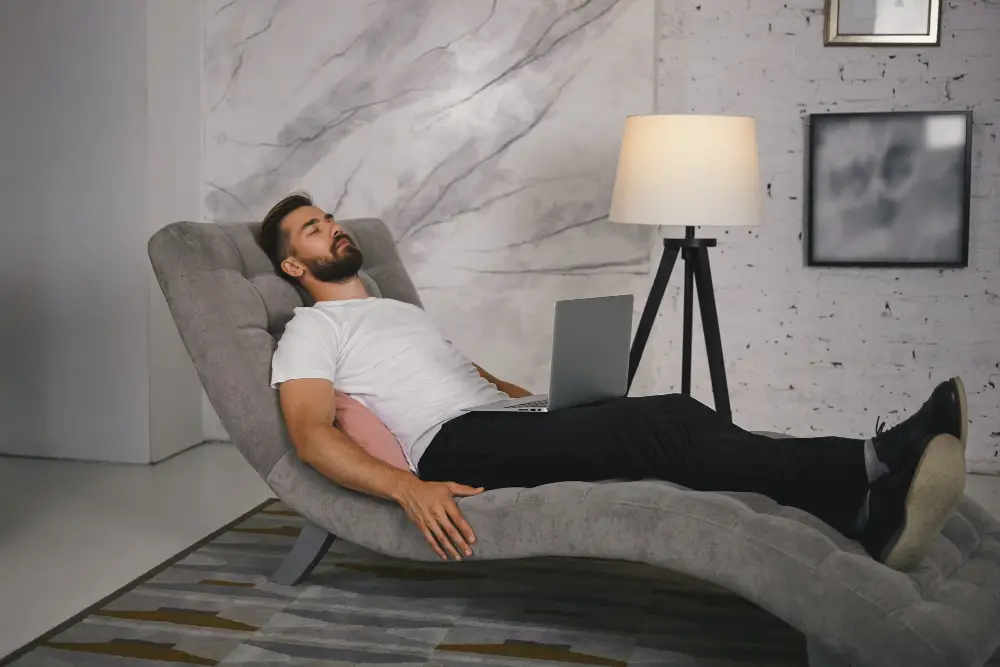
Some of the most common include sectional sofas, loveseats, recliners, futons and sleeper sofas. Each type has its own unique features and benefits.
Sectional sofas are great for large families or those who love to entertain guests as they offer plenty of seating space. Loveseats are perfect for smaller living rooms or apartments where space is limited but you still want a comfortable place to sit.
Recliners provide ultimate comfort with their adjustable backrests and footrests while futons can be converted into a bed when needed – making them ideal for guest rooms or small spaces that require multi-functional furniture.
Sleeper sofas also serve dual purposes by providing both seating during the day and an extra sleeping spot at night – perfect for those who frequently have overnight guests but don’t have a spare bedroom.
It’s important to consider your lifestyle needs before choosing which type of couch will work best in your home.
Pros and Cons of Sleeping On a Couch

On the one hand, it’s convenient if you don’t have a guest room or if you live in a small apartment where space is limited. It can also be cozy and comfortable, especially if your couch has soft cushions or pillows that provide support for your head and neck.
On the other hand, sleeping on a couch regularly may lead to discomfort due to its lack of proper support for your body. Couches are not designed with sleep in mind; they’re meant for sitting rather than lying down flat like beds do.
This means that sleeping on them could cause back pain or stiffness over time.
Another disadvantage of sleeping on a couch is that it may damage the sofa itself as we discussed earlier in this article. Consistent use as an alternative bed could wear out cushion supports faster than normal usage would leading to sagging cushions which will need replacement sooner than expected.
Couch Quality Factors
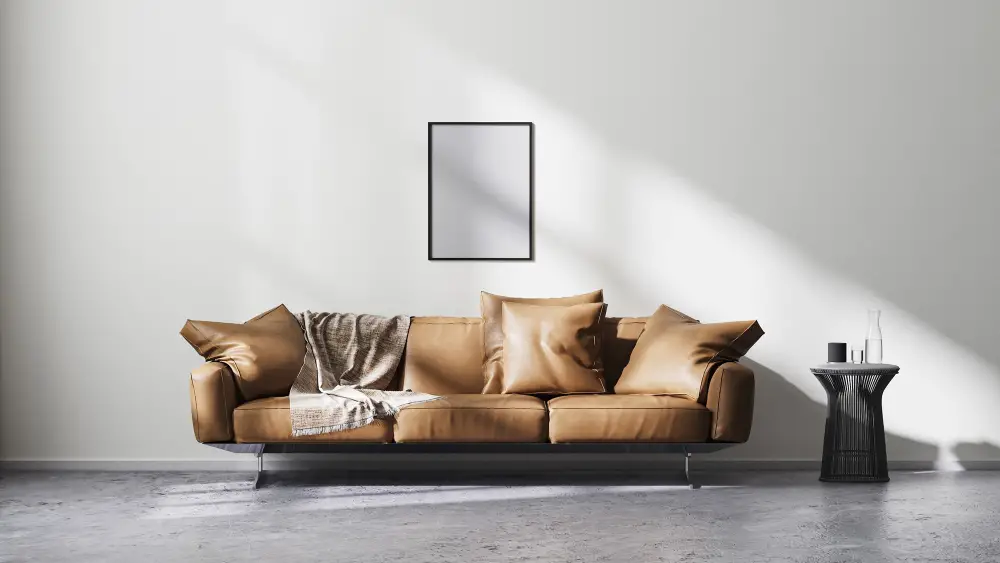
High-quality couches are designed with durable materials and construction techniques that ensure they last for years without significant wear and tear. On the other hand, low-quality couches may start showing signs of damage after just a few months of use.
Some factors to consider when assessing the quality of a sofa include its frame material (wood or metal), cushion filling (foam or down), upholstery fabric type (leather or synthetic), stitching technique, and overall design. A high-quality sofa will typically have sturdy joints, comfortable cushions that retain their shape over time, durable upholstery fabric resistant to stains and fading.
While investing in a high-end sofa may seem like an expensive proposition at first glance; it’s worth considering as you’ll save money in repairs/replacements down the line.
Can Couch Material Affect Sleep Quality?
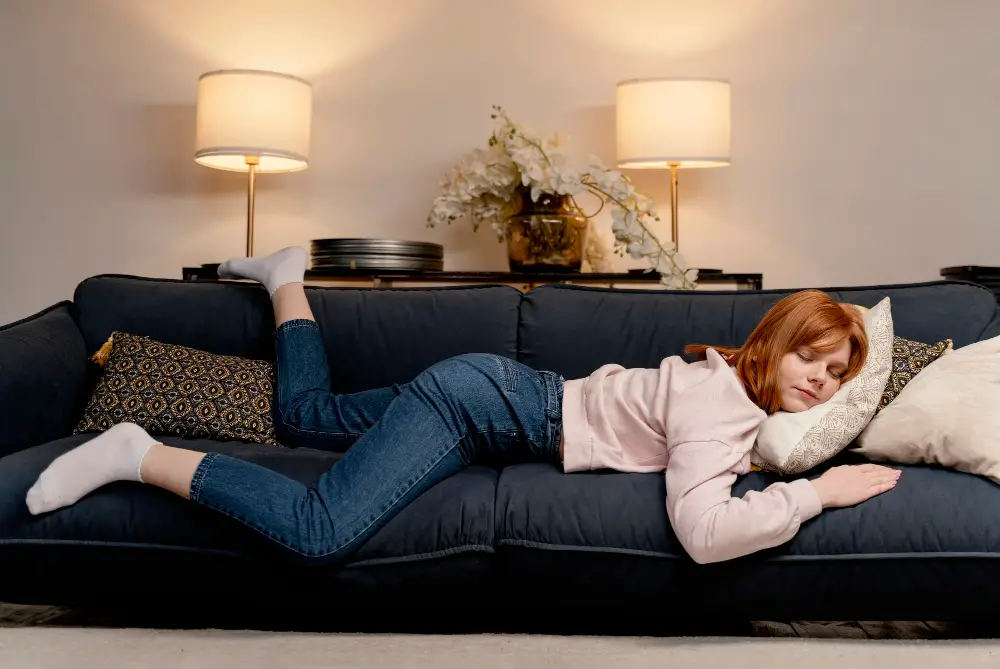
Some materials are more comfortable than others, and some may cause allergies or skin irritation that could disrupt your sleep. For example, leather couches tend to be cooler and less breathable than fabric ones, which can make them uncomfortable for sleeping in hot weather.
On the other hand, microfiber or cotton fabrics are soft and cozy to touch while also being breathable enough to keep you cool at night. Certain materials like wool or silk may help regulate body temperature by wicking away moisture from sweat during sleep.
It’s essential to consider how different materials affect your comfort level when choosing a couch for sleeping purposes. If possible, try out different types of sofas before making a purchase decision so that you know what feels best for you personally.
Couches Vs. Beds for Sleep
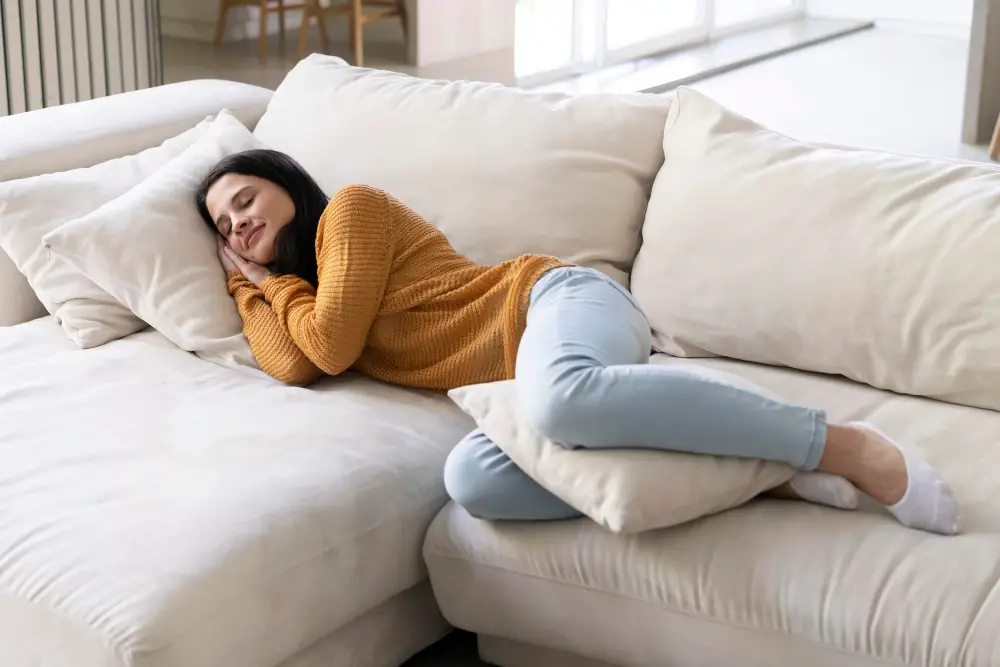
There are times when sleeping on a couch may be more convenient or necessary. So how do couches compare to beds in terms of sleep quality?
While some people may find sleeping on their couch comfortable and even preferable, it’s important to note that most sofas are not designed for long-term use as a bed replacement. Couch cushions can compress over time and lose support which can lead to discomfort during extended periods of rest.
Many factors such as the size of the sofa and its material composition can impact your comfort level while you’re asleep. For example, leather or vinyl upholstery might feel cold against your skin while fabric materials like cotton or microfiber could cause overheating.
Alternative Sleeping Solutions
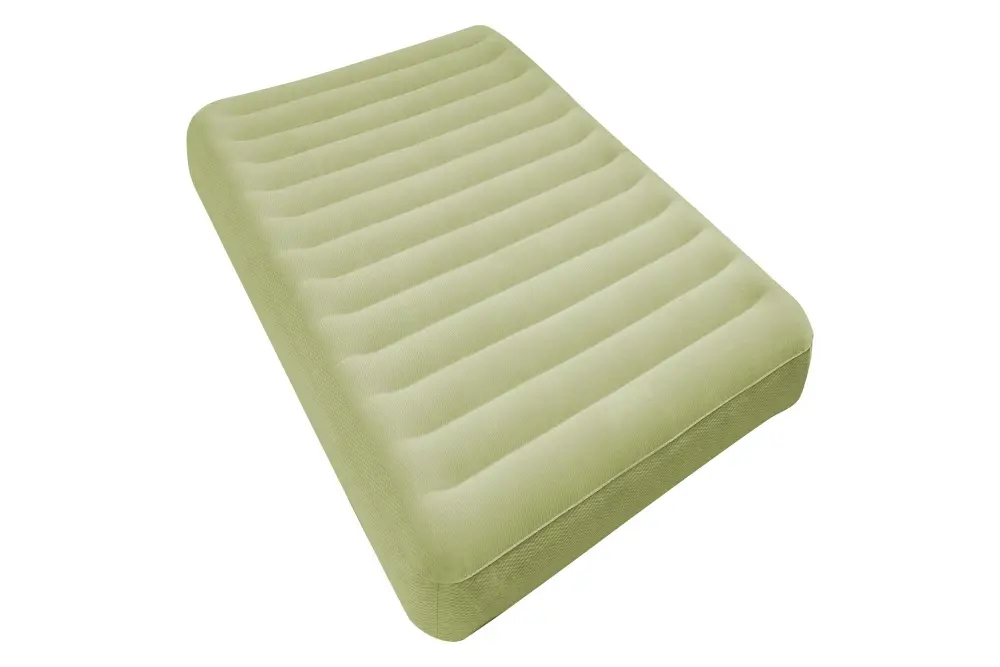
While a comfortable couch can provide temporary relief for an unexpected nap or overnight guest, it’s not ideal for consistent use as a bed replacement.
One option is investing in a quality air mattress that can easily be inflated and deflated when needed. Another solution is purchasing a sleeper sofa specifically designed for sleeping with built-in support and comfort features.
For those who prefer something more portable, there are also foldable cots or camping beds that offer both convenience and comfort. These options allow you to have your own designated sleep space without sacrificing the coziness of your living room furniture.
Ultimately, while sleeping on the couch occasionally won’t cause significant damage to your furniture piece; making it into an everyday habit will inevitably lead to wear and tear over time.
Solutions for Occasional Couch Sleepers
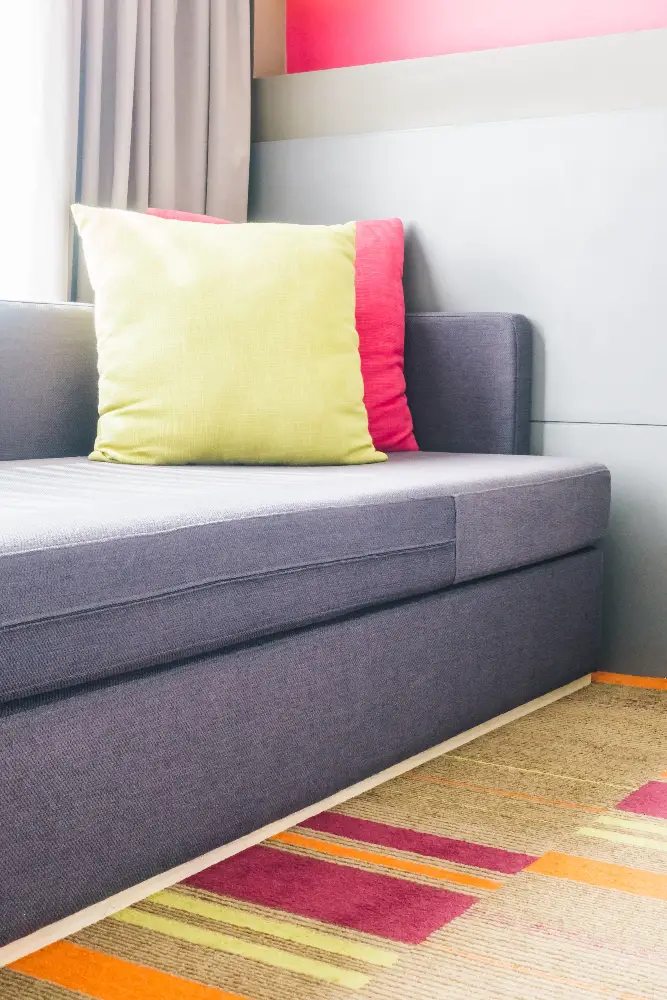
First and foremost, try not to make it a habit. Sleeping on your couch once in a while is unlikely to cause any significant damage, but doing so regularly will wear down the cushions and upholstery over time.
Another solution for occasional sleepers is investing in some protective covers or throws that can be easily removed and washed. These covers will help protect against spills, stains, and general wear-and-tear caused by sleeping on the couch.
You may also want to consider purchasing an air mattress or fold-out bed if you frequently have guests staying overnight. This way they’ll have their own designated sleeping space that won’t put unnecessary strain on your furniture.
Lastly, if you find yourself falling asleep often while watching TV or reading at night before heading off to bed – consider setting up a designated relaxation area with comfortable seating like recliners instead of using your main living room sofa as both daytime lounging spot as well as nighttime resting place.
Couch Lifespan

Generally speaking, a well-made couch with high-quality materials can last up to 15 years or more with proper care. However, if you’re using your couch as a bed regularly or have guests sleeping on it frequently without taking any precautions to protect it from wear and tear (such as using mattress pads), its lifespan may be significantly reduced.
It’s important to note that even if you don’t sleep on your couch regularly but still use it for lounging daily or entertaining guests often, this will also contribute to its overall wear and tear over time. To extend the life of your sofa regardless of how much you sleep on it is by investing in high-quality furniture covers that are designed specifically for sofas.
While sleeping occasionally on your sofa won’t necessarily ruin it overnight; however doing so consistently could shorten its lifespan considerably.
Regular Couch Maintenance

Here are some tips to help you maintain your couch:
1. Vacuum regularly: Use a vacuum cleaner with an upholstery attachment to remove dust and debris from the surface of the couch.
2. Clean spills immediately: If you spill something on your couch, clean it up as soon as possible to prevent stains from setting in.
3. Rotate cushions: To ensure even wear and tear on all parts of the sofa, rotate cushions every few months.
4. Fluff pillows: If your sofa has throw pillows or backrests that can be removed, fluff them regularly to maintain their shape and comfort level.
5. Avoid direct sunlight: Direct sunlight can cause fading or discoloration of fabric materials over time; therefore avoid placing furniture directly under windows where they will receive direct sun exposure for extended periods.
Couch Maintenance Tips
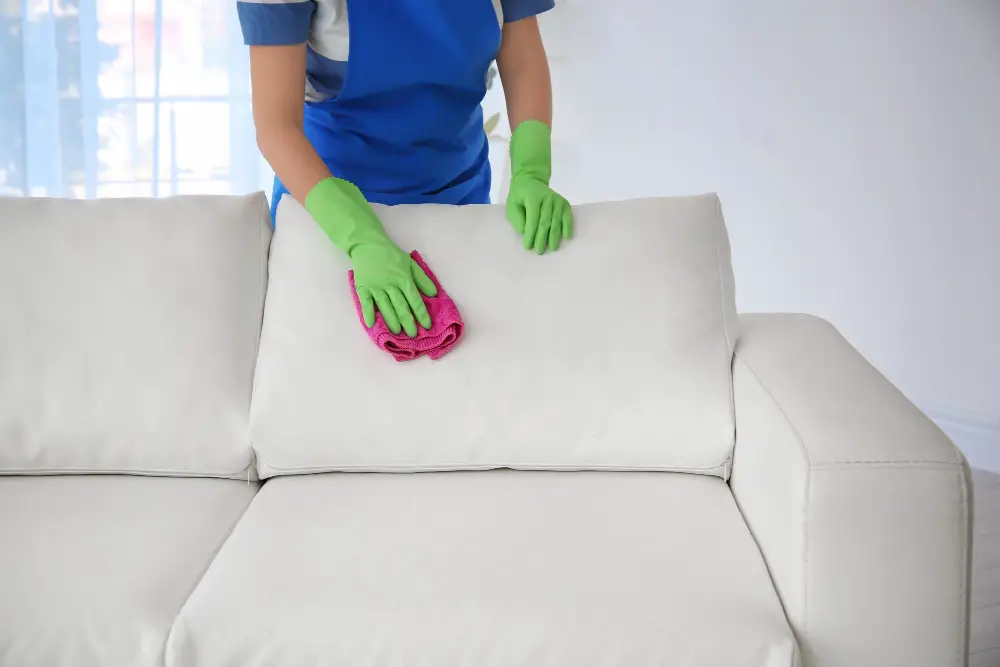
Regular maintenance can help prolong its lifespan and keep it looking new for longer.
Here are some tips for maintaining your couch:
1. Vacuum regularly: Use an upholstery attachment to remove dust, dirt, and debris from the surface of your couch.
2. Rotate cushions: To prevent uneven wear on cushions, rotate them every few months or as needed.
3. Fluff pillows: If you have decorative throw pillows or backrests with stuffing inside them, fluff them up regularly so they retain their shape and don’t become lumpy over time.
4. Clean spills immediately: Accidents happen! But if you spill something on your couch (especially liquids), clean it up right away before it has a chance to soak in and stain the fabric permanently.
5. Avoid direct sunlight exposure: Sunlight can fade fabrics over time; try not to place furniture in direct sunlight if possible or use curtains/blinds during peak hours of sun exposure.
Repairing Couches After Sleep-Related Damage
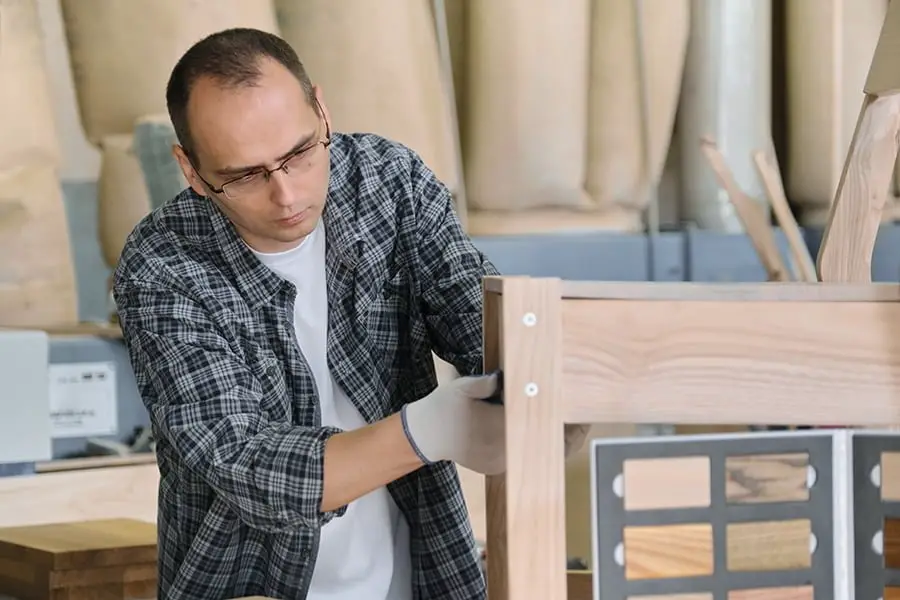
There are ways to repair the damage caused by consistent use as a bed. The first step is to identify the type of damage that has occurred.
If there are stains or spills on the upholstery, it’s important to clean them up as soon as possible before they set in permanently.
For more significant damage such as sagging cushions or broken frames, it may be necessary to call in professional help. A furniture repair specialist can assess the extent of the damage and provide recommendations for repairs or replacements.
In some cases, simple DIY fixes like adding extra padding under sagging cushions can make all the difference in restoring comfort levels without having to replace an entire couch.
Remember that regular maintenance is key when it comes to extending your couch’s lifespan and preventing sleep-related damages from occurring in future. By following proper care instructions provided by manufacturers (such as avoiding jumping on furniture), you’ll ensure that your sofa remains comfortable for both sitting AND sleeping purposes!
FAQ
Is it bad to sleep on my couch?
Occasionally sleeping on your couch is unlikely to harm your long-term health, but doing so every night may increase the risk of chronic back and neck pain.
Is it better to sleep on the floor or couch?
Sleeping on the floor is better for maintaining good posture and supporting the natural curvature of your spine.
Does jumping on a couch ruin it?
Yes, jumping on a couch can ruin it by damaging the quality of the sofa cushions, as it is not designed to carry that weight.
Will sleeping on a leather couch ruin it?
Yes, regularly sleeping on a leather couch for prolonged periods can cause damage, such as sagging cushions and frame deterioration.
How can I prevent damaging my couch while sleeping on it?
To prevent damaging your couch while sleeping on it, consider using a sofa cover or placing a blanket on the couch to protect the fabric.
Are certain types of couches more suitable for sleeping than others?
Indeed, sofa beds and futons are typically more suitable for sleeping due to their ability to convert into a comfortable sleeping surface.
What are the long-term effects of frequently sleeping on a couch?
Long-term effects of frequently sleeping on a couch include poor sleep quality, discomfort, body pain, and potential spinal misalignment.
You may also like to read:
